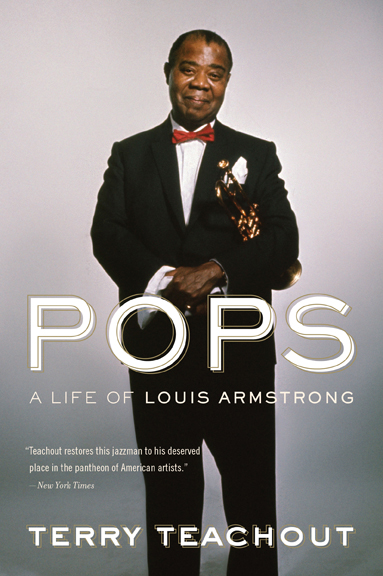Joe Orton, interviewed on ITV’s The Eamonn Andrews Show five months before his death in 1967:
(This is the latest in a weekly series of arts-related videos that appear in this space each Wednesday.)
Archives for September 2010
TT: Right to left
 I received the first copy of the paperback edition of Pops: A Life of Louis Armstrong in yesterday’s mail. It’ll be published by Mariner Books on October 7, and you can already order a copy from Amazon by going here.
I received the first copy of the paperback edition of Pops: A Life of Louis Armstrong in yesterday’s mail. It’ll be published by Mariner Books on October 7, and you can already order a copy from Amazon by going here.
The Pops paperback is a good-looking piece of work, bestrewn inside and out with vanity-piquing quotes from some of the book’s admiring reviewers. Even if you already own the hardcover edition, you might want to consider buying a copy of the paperback for two reasons. Not only did I correct a dozen or so niggling little errors in the text, but Mariner has also fixed the cover photograph of Armstrong, which was inadvertently reversed on the original dust jacket.
The funny thing about this blunder is that nobody who knew Armstrong–including four close friends of his who read the manuscript of Pops–noticed it. It wasn’t until I received a pair of e-mails from James Breig and Kenny Harris, two readers of this blog who have very sharp eyes, that I realized that the cover photo had been flipped. Now that I’m able to view the two editions side by side, I’ll confess that I can still barely tell the two Satchmos apart. Except for a tiny depression on his forehead, he was a symmetrical-looking guy.
Be that as it may, I’m delighted to nudge Pops a bit closer to perfection. I sat down last night and read through it for the first time in months, and I was pleased and proud. I think I did right by Louis Armstrong. I hope you agree.
TT: Almanac
“Civilizations have been founded and maintained on theories which refused to obey facts.”
Joe Orton, What the Butler Saw
TT: Almanac
“What good is an obscenity trial except to popularize literature?”
Rex Stout, The League of Frightened Men
TT: Loving tongue
 I just received in the mail two copies of Pops: A Vida de Louis Armstrong, the Brazilian edition of Pops: A Life of Louis Armstrong, which was published last month by Larousse. The design of the book is essentially identical to that of the American edition, except that it’s in Portuguese. The translators are Andrea Gottlieb and Castro Neves, and I wish I could tell you that they did a fabulous job. Alas, I must confess to being humiliatingly ignorant of a language to which I have nonetheless spent countless hours listening. Would that my longstanding passion for the music of Antônio Carlos Jobim, João Gilberto, Sérgio Mendes, Luciana Souza, and Trio da Paz had miraculously caused me to learn Portuguese by osmosis, but the only word I know in that lovely, liquid tongue is, appropriately enough, saudade.
I just received in the mail two copies of Pops: A Vida de Louis Armstrong, the Brazilian edition of Pops: A Life of Louis Armstrong, which was published last month by Larousse. The design of the book is essentially identical to that of the American edition, except that it’s in Portuguese. The translators are Andrea Gottlieb and Castro Neves, and I wish I could tell you that they did a fabulous job. Alas, I must confess to being humiliatingly ignorant of a language to which I have nonetheless spent countless hours listening. Would that my longstanding passion for the music of Antônio Carlos Jobim, João Gilberto, Sérgio Mendes, Luciana Souza, and Trio da Paz had miraculously caused me to learn Portuguese by osmosis, but the only word I know in that lovely, liquid tongue is, appropriately enough, saudade.
Even though I’ll have to leave it to my Brazilian friends to tell me whether Ms. Gottlieb and Mr. Neves got it right, I still managed to spend an exceedingly pleasant hour leafing through the Brazilian edition of Pops and marveling at how much cooler I seem to sound in Portuguese. My favorite passage from Pops, for instance, is the last paragraph:
Faced with the terrible realities of the time and place into which he had been born, he did not repine, but returned love for hatred and sought salvation in work. Therein lay the ultimate meaning of his epic journey from squalor to immortality: his sunlit, hopeful art, brought into being by the labor of a lifetime, spoke to all men in all conditions, and helped make them whole.
Here it is in Portuguese:
Confrontado pelas terríveis realidades do lugar e da época em que nasceu, ela não se afligiu, mas retribuiu ódio com amor e procurou a salvação no trabalho. É aí que está o resultado supremo da épica jornada que percorreu da esqualidez à imortalidade: sua arte, iluminada pelo sol, cheia de esperança, criada pelo trabalho de uma vida e capaz de tocar todos os homens de qualquer condição, e torná-los completos.
Doesn’t that just make you want to roll over and purr?
 As I flipped through the book, I ran across a number of additional footnotes that were credited to the translators. Notwithstanding my inability to speak Portuguese, I could see that their purpose was to explain to Brazilian readers the meanings of various untranslatable English-language expressions, including Uncle Tom, minstrel show, black-and-tan club, poboy, hepcat, and–this one is my favorite–The Jetsons:
As I flipped through the book, I ran across a number of additional footnotes that were credited to the translators. Notwithstanding my inability to speak Portuguese, I could see that their purpose was to explain to Brazilian readers the meanings of various untranslatable English-language expressions, including Uncle Tom, minstrel show, black-and-tan club, poboy, hepcat, and–this one is my favorite–The Jetsons:
Familio do desenho animado de mesmo nome da Hanna-Barbera, criado nos anos 1960 e ambientado no ano de 2062, no qual o futuro é descrito como um mundo de robôs, hologramas, carros voadores etc.
I suspect that these footnotes are in large part responsible for the other main difference between the two versions of Pops, which is that the Brazilian edition is thirty-six pages longer than the American edition.
I was fascinated, by the way, to read the following translation and explication of these lines from a song by Fats Waller and Andy Razaf: My only sin is in my skin/What did I do to be so black and blue? Take it away, colleagues:
Meu único pecado está na minha pele/O que fiz para ser tão negro e trist? [blue, em inglês, significa tanto a cor azul quanto tristeza].
Quanto tristeza, indeed!
* * *
Luciana Souza sings “Docemente” with the Fred Hersch Trio:
If an audiobook version of Pops should ever be published in Brazil, I’d like her to read it.
TT: Almanac
“Well, here I went to Long Island Rail Road. It’s the first time I’ve done that, so I got to Penn Station really early, so I could ask directions. Some of the policemen recognized me, and I bought my senior ticket to Montauk for $11, off peak. I sat in the waiting room with a lot of people, and occasionally somebody recognized me. It’s lovely, and it’s very important to be respectful of it and accept it. Occasionally I have to be aware that there is also, in some people, a degree of resentment, as though I would think that I’m any different than anyone else. I’m not. I thrive on modesty and humility. I never said that I had perspective and judgment.”
Elliott Gould, interview, New York Times, Sept. 3, 2010
TT: Just because (in memoriam)
Pablo Casals plays the G Major Cello Suite at the Prades Festival in 1954:
TT: Almanac (in memoriam)
“I would define true courage to be a perfect sensibility of the measure of danger, and a mental willingness to endure it.”
William Tecumseh Sherman, Memoirs of General W.T. Sherman
